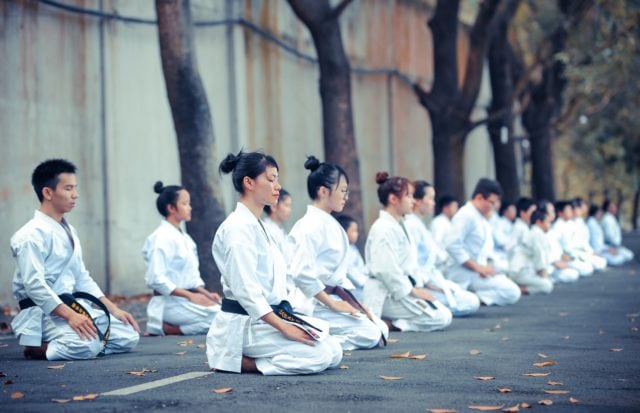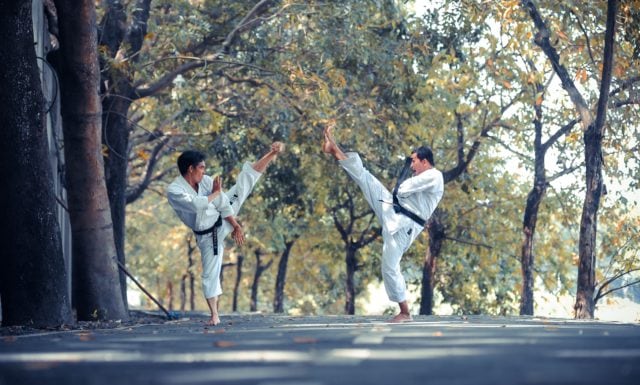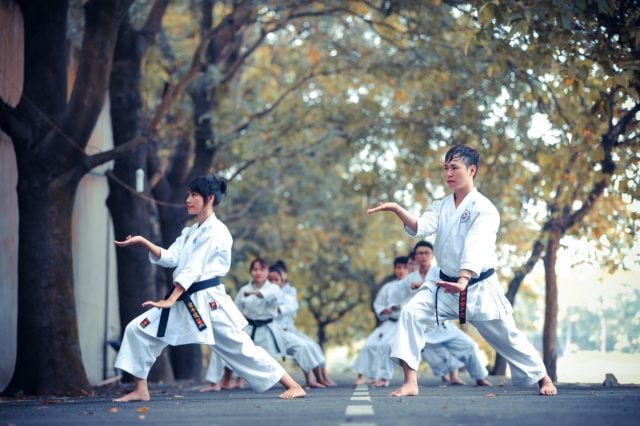
Self-discipline is one of those things that everyone wishes they had but struggles to develop.
Take a look at your own life. What’s that one thing you want to do but just can’t seem to make yourself do it? Write a book? Lose weight? Exercise? Become an early riser. Use social media less?
It’s tough, right?
The good news is that you can be more disciplined. No matter who you are or what you want to accomplish, you can develop self-control and self-discipline.
In this guide, we’re going to walk you through the what, why, and how of self-discipline. We’re going to give you effective strategies for how to improve your self-discipline and we’re going to help you develop the proper mindset.
Ready? Let’s get started.
What Is Self-Discipline?

Before we talk about how to build self-discipline, let’s make sure we’re all on the same page about what self-discipline actually is.
Self-discipline is the ability to move toward your ultimate goals regardless of what you’re feeling in the moment, physically or emotionally. It’s important to note that self-discipline is about moving toward your ultimate goals, which may mean saying no to short-term desires and goals.
When you have self-discipline, you are able to do the things that will take you where you ultimately want to be. You can resist temptation, distractions, etc. Ultimately, discipline and self-control are about having a long-term vision. You’re able to see past what’s right in front of you to your final destination. You’re less likely to get sidetracked by unimportant things and more inclined to take action on what will move the needle most.
Author Jim Rohn puts it this way: “Discipline is the bridge between goals and accomplishment.”
E.M. Gray said this about self-discipline: “The successful person has the habit of doing the things failures don’t like to do. They don’t like doing them either necessarily. But their disliking is subordinated to the strength of their purpose.”
Simply put, self-discipline allows you to push through any form of resistance in order to achieve your ultimate goals. Building self-discipline allows you to become the person you want to be and create the life you want to live.
Why You Should Build Self-Discipline

Why should you want to improve your self-discipline? You might even be thinking, All this talk about self-discipline and self-control sounds really restricting and not very fun. I’m not so sure that I want that.
And while that perspective is certainly understandable, here’s what you need to understand…
Self-Discipline = Freedom
When you’re disciplined, you can achieve the things that will bring you the most satisfaction. You can move forward on that novel instead of indulging the bad habit of wasting time on Reddit. You can lose weight instead of binging on ice cream every night. You can take action to code that killer app instead of watching hours of Netflix.
Studies have shown that talent is not enough when it comes to accomplishing difficult goals. What’s also needed is the grit (aka self-discipline) to keep going in the face of hard challenges. As Angela Duckworth notes:
The gritty individual approaches achievement as a marathon; his or her advantage is stamina. Whereas disappointment or boredom signals to others that it is time to change trajectory and cut losses, the gritty individual stays the course.
In other words, successful people have the ability and willpower to keep pursuing their goals over a long period of time, even in the face of challenges.
Now, to be clear, being disciplined doesn’t mean that you never enjoy things. You’re human, and ice cream tastes delicious. There are some great movies on Netflix, and Reddit can be a fun place to explore.
Discipline allows you to enjoy those things in ways that keep you moving forward toward your ultimate goals and desires. You eat a bowl of ice cream at the end of the week as a way of rewarding yourself for exercising. You watch Netflix, but only after you’ve worked on that awesome app that’s going to change your life.
Discipline isn’t the enemy of pleasure. Rather, it helps you enjoy pleasure in healthy and productive ways.
Even More Benefits Of Self-Discipline
And if that’s not enough, having self-discipline has been proven to have a host of other benefits, including:
- Decreased anxiety
- Improved physical health
- Better relationships
- Increased resilience
- Higher levels of happiness
Self-Control and Success Go Together

If you look at the most accomplished people in the world, they almost all rely upon self-discipline to achieve whatever goal is before them. Yes, there are a few rare exceptions, such as Babe Ruth, who made up for his lack of impulse control by relying exclusively on his natural talents. But those like him are rare, rare, exceptions.
Warren Buffet said, “We don’t have to be smarter than the rest; we have to be more disciplined than the rest.”
Harvey Mackay said, “It doesn’t matter whether you are pursuing success in business, sports, the arts, or life in general: The bridge between wishing and accomplishing is discipline.”
Brian Tracy said, “Your ability to discipline yourself to set clear goals, and then to work toward them every day, will do more to guarantee your success than any other single factor.”
If you want to achieve great things, you must possess the ability to discipline yourself. To block out all the distractions and temptations and run with all your might at a goal that really matters to you.
For a deeper dive into the habits that lead to greatness, check out this article: How to Build the 25 Habits of People Who Are Happy, Healthy and Successful.
How To Improve Your Self-Discipline

Now that we’ve talked about what self-discipline is and why it matters, let’s talk about specific ways to be more disciplined.
Disconnect Discipline From Self-Worth
One of the biggest reasons people struggle with self-discipline is that they connect it to their self-worth. In other words, they think that their failures of self-control and inability to resist temptation make them a bad person somehow.
The reality, however, is that in the huge majority of cases, discipline and morality have no connection. You’re not a bad person because you watched too much Netflix or overate. You’re just like everyone else. You have your ups and downs, your good moments and not so great.
If you associate a lack of discipline with your self-worth, you’ll end up in a downward cycle of shame. You feel bad about skimming Reddit instead of working on your important project. Does that give you more motivation to get to work? Of course not. If anything, it makes you more inclined to get back on Reddit to distract yourself from your bad feelings.
So the first step in strengthening your self-discipline is to separate it from your value as a person. You are valuable and worthy regardless of what you achieve.
Set Purpose-Driven Goals
Self-discipline will help you achieve your goals only if there is meaning and purpose behind those goals. If you set a goal simply because you feel like that’s what you should do, you’ll have very little motivation to pursue that goal.
For example, say you set a goal to lose 25 pounds, simply because you feel like you need to lose some weight. The motivation behind this goal is abstract and not very compelling. It doesn’t provide much willpower against the temptation to snack or increase your desire to exercise.
On the other hand, the goal of losing 25 pounds so that you can have the energy to coach your child’s soccer team is a much more compelling goal. You can clearly see the benefits and there is a strong purpose behind the goal. You’ll want to exercise and eat a healthier diet. The odds of your success are much higher when you can visualize the benefits.
The reality is that it’s really tough to be self-disciplined and have the willpower for something that you don’t really care that much about.
So start by setting a goal that has real meaning behind it. Find your big, compelling, motivating purpose. Don’t settle for abstract, vague objectives. Decide what you want and why you really want it.
When you’re tempted to cheat on your goal, visualize the outcome. Visualize exactly what it will be like when you accomplish your goal. That will strengthen your resolve.
For an in-depth guide to goal setting, read this article: The Ultimate Guide To Goal Setting.
Know Your Self-Discipline Triggers
All of us have certain temptations that are really hard to resist. Things that really test our self-discipline sabotage our success.
Maybe you’re really tempted to constantly check your email or social media. Maybe it’s really hard for you to resist the allure of the snooze button. Or maybe you always find yourself reaching for junk food even though you’re trying to drop a few pounds.
Knowing our self-discipline triggers helps us plan for how to deal with them. It helps us stay away from those things that often sabotage us and make it less likely that we’ll achieve goals that matter to us.
Design Your Environment For Self-Control
Your environment can either strengthen or weaken your self-discipline. How many times have you been working on an important task when your phone vibrates or your inbox chimes? In those moments, it requires self-discipline to not pick up your phone.
However, if you shut your phone off altogether and close your inbox, you minimize the temptations and less self-discipline is required to stay on task. That is a small example of designing your environment.
How To Optimize Your Environment
Now, there are essentially three ways you can optimize your environment so that it supports self-discipline:
- Reduce temptation around you
- Make it more difficult to give in to temptation
- Make it easier to do good habits
The first strategy is pretty obvious. Remove as many temptations as possible. If you don’t want to reduce your social media habit, delete the apps from your phone. If you don’t want to snack on junk food, keep it out of your house. If you want to focus at work, close your office door so you can’t hear people talking in the hall.
With the second strategy, your aim is to increase the amount of effort required for you to indulge in unproductive behaviors So, say you want to spend less time watching Netflix. Every time you’re done watching, log out so that you have to take the time to log back in next time. This adds a little bit of friction to the watching process and gives you time to decide if you really want to do it.
The third strategy is the inverse of the second. Your goal is to reduce friction around good habits as much as possible. For example, a common strategy used by many writers is to often end a writing session in the middle of a sentence.
Why? So that they know exactly what they’re going to say when they start the next day. This seemingly small strategy reduces the anxiety of not knowing what to write at the beginning of each session. It makes it easier to get started.
Try to come up with as many ways as possible to reduce friction around good habits. Put your gym clothes out the night before. Put healthy snacks in easily accessible places. Close all your applications on your computer and clean up your workspace so that it’s ready to go first thing in the morning.
These relatively small actions will nudge you toward using self-control every day.
Think Smaller
One of the biggest reasons people fail to achieve their goals is that they think too big. For example, they decide that they want to learn to meditate, which is a good goal. However, they start by trying to meditate for a half-hour every day.
For someone who has never meditated before, this can be pretty overwhelming. Within the first few moments, their mind is wandering all over the place. It takes all the discipline they have to make it a full 10 minutes. And so they get discouraged and give up altogether.
It might surprise you to realize that success often comes from thinking smaller.
The Muscle Of Self-Discipline
It’s important to realize that discipline and self-control are like muscles that get stronger with use. If you haven’t worked out much, you can’t go into the gym and expect to bench press 200 pounds. You need to work up to that.
The same principle is true with developing self-discipline. If you’re starting to learn a new habit or practice, start small and work your way up.
In his book Atomic Habits, James Clear recommends implementing the “Two Minute Rule” whenever you’re starting a new habit. Whatever you’re trying to do should only take you two minutes.
Instead of meditating for 30 minutes, meditate for two. Instead of attempting to read for an hour before bed, read a single page. Instead of writing 10 pages, write a single paragraph. Instead of trying to walk 10,000 steps, walk 100.
What you do next is up to you. You can keep meditating or you can stop. What matters most is that you keep at it, day after day. And what you might discover is that it’s much easier to keep going after the initial short period.
The reality is that using self-discipline to develop good habits is like pushing a car down a hill. The hardest part is right at the beginning, but pretty soon momentum kicks in. In other words, it’s much easier to keep doing something than to start. So think small and make it as easy as possible to start.
As Clear puts it in his book:
As you master the art of showing up, the first two minutes simply become a ritual at the beginning of a larger routine. This is not merely a hack to make habits easier but actually the ideal way to master a difficult skill. The more you ritualize the beginning of a process, the more likely it becomes that you can slip into the state of deep focus that is required to do great things.
Lean Into Discomfort (Slowly!)
One reason we struggle so much with self-discipline is that we flee from any sort of discomfort. The moment we encounter anything uncomfortable, we try to distract ourselves or get out of the situation.
But the truth is that doing anything worthwhile requires allowing yourself to feel uncomfortable at points. If you’re coding an app, there will be times when things just don’t work right and you feel frustrated. In those moments, you’ll be tempted to stop working and do something easier.
But before you stop, lean into the discomfort just a little bit. Keep going just a little bit longer. You don’t have to endlessly bang your head against the wall for the next hour. Just do one more thing. Train yourself to keep going a little longer after you want to quit.
The more you do this, the greater your tolerance for discomfort will be. Your self-discipline and willpower will be stronger, and you’ll have the ability to keep going longer. You’ll be able to resist the temptation to give up when things get hard.
Don’t Wait Until You Feel It
If you want to achieve success, you need to have the ability to take action even if you don’t particularly feel like it. Great athletes practice day in and day out, regardless of how much motivation they’re feeling. Great writers set a daily writing goal and always hit that goal, week after week.
Often, there will be times when you simply don’t have the motivation to do what you need to do in order to hit a particular goal. In those moments, you need the ability to take the next step even if you don’t feel it.
Join A Support Group

A huge amount of our behavior is socially driven. Every group we are a part of has very specific expectations. At your job, you’re expected to dress and behave in specific ways. When you go to the gym, you wear workout clothes instead of a suit and tie because that’s what everyone else does.
Joining a community of people who are pursuing the same goals as you can be a big boost to your self-discipline and willpower. When you’re around people who act a certain way, you tend to act in a similar fashion so that you meet the group’s expectations. There is external accountability to help you keep moving toward an important goal.
So what group or community can you join that will push you toward where you want to be and improve your self-discipline 1? If you want to read more books, join a book club. If you want to scale your business, join a mastermind of like-minded entrepreneurs. If you want to get in shape and exercise more, join a running club.
If you’re having trouble finding a local community to join, you can certainly find one online. Between Facebook and LinkedIn groups, you can connect with people who will push you toward success.
And when you know that people are holding you accountable and expecting you to do certain actions, it reduces the amount of self-discipline needed to perform those actions.
Embrace Rituals
Rituals are actions that you perform repeatedly without much thought or effort. Drinking a cup of coffee every morning is a ritual. Checking your phone first thing when you wake up is a ritual. Brushing your teeth at night is a ritual. It takes little to no self-discipline to perform these tasks.
Creating rituals around important, yet challenging tasks can make it easier to perform those tasks. For example, say that you want to do two hours of deep work every morning before you check your email, social media, or anything else.
You could create a ritual in which you:
- Drink a cup of tea
- Do a 10-minute meditation
- Turn on music that helps you focus
- Start your deep work session
The Power Of Rituals
The more consistently you perform rituals, the easier it will become for you to enter into deep work. There will be less internal resistance because the ritual trains your brain and body. It signals that it’s time to begin working and that other things, like social media, are not to be used. The power of rituals is that they lower the amount of self-discipline required to do difficult tasks.
So what rituals can you create that will support self-discipline and help you accomplish your biggest goals?
Want to improve your health? Create an exercise ritual that gets you in the right headspace for running or going to the gym. Want to improve your knowledge on a certain subject? Create a reading or study habit that you follow every day. Want to learn a particular skill? Develop a practice ritual that you observe during the week.
Manage Your Energy
There’s an obvious connection between energy levels and self-discipline. When you’re tired, it’s much harder to use self-control and make choices that take you toward your ultimate goals.
When you’re wiped out, working on that important project seems almost impossible. Cooking a healthy meal is much less attractive than grabbing fast food. Netflix seems so much more appealing than trying to work on your novel.
In light of this, it’s essential to manage your energy if you want to maintain high reserves of self-discipline and willpower.
Respect Your Body and Mind
At a minimum, managing your energy involves getting sufficient sleep every night. You can’t expect to perform at a high level and have self-discipline if you’re only getting 4 hours of sleep. You need to commit yourself to optimizing your sleep.
But even more than that, you should also manage your energy throughout the day. Your body’s energy levels ebb and flow in accordance with your ultradian rhythms. Every 90 – 120 minutes, your body goes through a cycle of increased energy followed by a period of fatigue.
To be more productive, you need to work in concert with your body’s natural rhythms. You need to double down when your energy levels are rising and then allow yourself a period of rest when you start to feel fatigued. Trying to work against these cycles can be counterproductive and ultimately harmful to you.
In their book The Power of Full Engagement, Jim Loehr and Tony Schwartz say:
We are capable of overriding these natural cycles but only by summoning the fight-or-flight response and flooding our bodies with stress hormones that are designed to help us handle emergencies. The long-term cost is that toxins build up inside us. We can only push so hard for so long without breaking down and burning out.
If you want to be disciplined, do difficult tasks when your energy is peaking and then give yourself space and time to recover. Don’t try to just power through the entire day.
Be Kind To Yourself
When it comes to discipline, self-control, willpower, and motivation, some days will be better than others. Some days you’ll absolutely crush it, making huge amounts of progress on the things that matter most to you. Other days won’t go so well. You’ll waste time on social media or stay up too late or eat that junk food.
Celebrate the good days and be kind to yourself on days when you struggle. What matters most is that not that you’re perfectly disciplined, but that you keep trying. Get back up, dust yourself off, and get back on track. Just don’t stop making progress.
When you’re hard on yourself, you experience shame, and few things kill discipline more than shame. On the other hand, when you’re kind to yourself you’re able to recognize that you’re a human who has ups and downs, just like everyone else.
Freedom Is Calling
Jocko Willink is well known for saying, “Discipline equals freedom.”
And he’s right. As you grow in discipline, you’ll begin to experience more freedom. Instead of being governed by short-term desires and impulses, you’ll have the freedom to pursue the things you truly desire.
Ultimately, discipline can take you to places you never thought possible. It allows you to build the business, code the app, run the marathon, write the book, or whatever else your heart desires.
If you feel overwhelmed, don’t be. Remember to start small and build from there. Slowly by slowly, your discipline will strengthen, allowing you to do even more.
So get started today. Freedom is calling.

Superb Content. Explained so nicely with simple language and Practical Examples . Very Helpful article. Hats off to the Author.